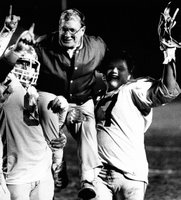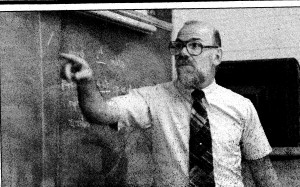 I attended a retirement dinner Wednesday night for three teachers with whom I had worked for more than 30 years. A good sized crowd of the living celebrated their many achievements, and the dead, by name, and by the collective power of memory, appeared, and then left with me, and with many others as well I suspect. This is Joe.
I attended a retirement dinner Wednesday night for three teachers with whom I had worked for more than 30 years. A good sized crowd of the living celebrated their many achievements, and the dead, by name, and by the collective power of memory, appeared, and then left with me, and with many others as well I suspect. This is Joe.
At the end of the evening, I took the long way home, driving slowly over back roads, all the windows open, the smooth turns and low rhythmic feel of movement and cool air creating a dream-time as it so often has in the past. The headlights turned the road’s coils into stark green corridors, the illumination constant but the scenes shifting at 20 miles per hour. One part of the mind remains on alert – here a fawn, probably more deer in the undergrowth, insects aloft everywhere, blind curves automatically producing a slower speed, but with ghosts as silent passengers another part of my awareness looks into the past, seeing again the indelible mark left by those who are gone.
I do not like nostalgia – all that horses*** longing for a gilded age when the world was a better, more honorable place, and where all the memories are shot in a gauzy soft focus. The treachery of such a lie is that it can rob us of the present, which is all we possess and where tangible treasures might be discovered, and it does a disservice to the once vigorous dead, who, mummified in beatitudes, smile like simple-minded saints, their sharp humor and pain, their battles and deep joys all buried under a saccharine allure.
When I come to a flat away from homes and lights, I brake to a stop, place the car in park and turn off the ignition. The darkness is immediate. The engine noise and tire friction are replaced by the sound of wind in the trees around me, and then by all the noises of a summer night. Fireflies hover over a field. I stopped because I did not want the drive to end too quickly; this small offense makes the darkness more powerful, and the two specters who have been on my mind, Joe and Roger, suddenly more vivid.
Joe bore a curse. Those who knew him well knew the nature of that curse. He never escaped it. But he also possessed the gift of the most intense authenticity I may have known in another. There was nothing false in him. Although strangely shy, he was unafraid of other men. He was the best coach I have ever seen and a teacher who valued hard work and despised BS. If he liked you, he filled you with life, and the nature of that life lay in his ability to strike you into helpless, rolling laughter.
Now I can remember Roger’s headaches, and how they could be so strong as to be disabling. I walked in on him once in an empty faculty room where he was stretched out on the couch, a damp paper towel on his forehead, his lips pursed in pain. He tried to sit up quickly, and he tried to cover the moment with a weak joke. He never missed school, his classroom being the arena where he first made every child at home, and then he inspired them to be better people.
It should mean something to the oblivious world that a person possesses the talent to love all those anonymous children as they enter a classroom, September after September. By love I mean the promise on the part of a teacher to tell kids the truth, to see them as individuals, to treat them fairly, to offer them the example of his or her own enthusiasm, to attempt to inspire them, to have them know much more in June than they brought with them to begin. Roger and Joe loved kids. Both would have been embarrassed by this compliment. Both would have tried to cover their embarrassment with a joke; Joe’s would have been racy. We would ignore their deflections. We who knew them remember their integrity. Our love persists. No, I don’t want to go back, but I do miss them. They left too early. They had more to give. They deserved more of the present.
At one point during the speeches I felt such affection well up in me. God, but I love teachers. Besides the military and cops, what other authority figure in this era of political correctness and of a timid acceptance of every kind of cultural irrationality says “No” many times to kids and parents and means it? Who else can make that “No” an affectionate invitation to keep trying? They may not be able to do much about it, but who else besides teachers can see so clearly when their emperors drop their clothes? Who else will give second, third, fourth, chances in the multiples of five to another because by occupation they operate with a belief that human beings are capable of deep change? Who else besides priests and ministers forgives sin so readily? What other crowd gathered together can produce so much laughter?
La vie est pour la vie. Life is for the living. I turn the ignition and the lights jump on; the ghosts withdraw to their honored place, and the young move up as they should. It feels good to drive on, but now I want some music — Paul Simon singing about Graceland. He said recently that music is like a prayer. That sounds right. May we all tumble into Graceland.
